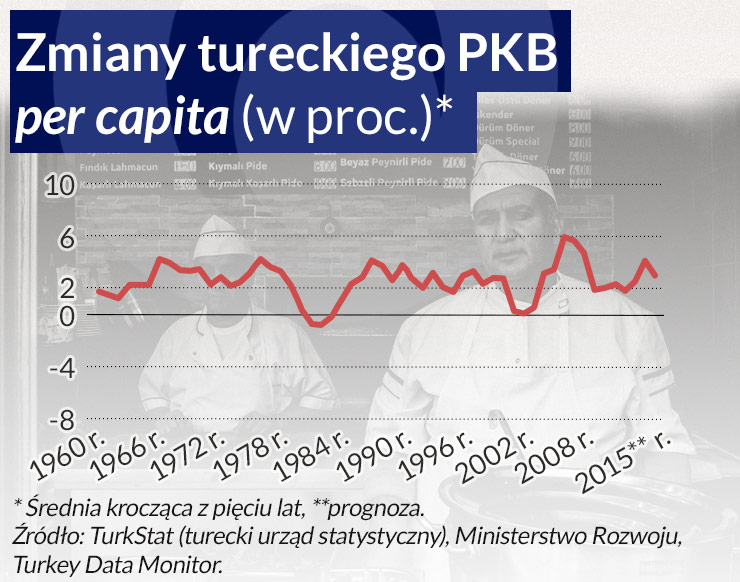Economy
 Economy
Economy
The dynamics of Turkey's economy is a mixture of modern industry and traditional agriculture, which sector still employs over 40% working. Privatization in the so-called. smali businessie has already reached its peak, but the most important economic entities, like a big industry, banking, transport and communication, are still controlled by the state. Gross national product has been increasing by 7% annually, but sometimes political crises can reduce it effectively. This proves the great influence of politics on the economy. State economic enterprises (so-called. KIT-y) play a huge role in the Turkish market. These are subsidy based corporations, and therefore susceptible to political influence, where corruption is widespread. These corporations include, among others. refinery, electricity, tobacco and alcohol products and sugar factories.
Taxes are the main source of budget revenues, import duties and state monopolies. Over the years 40. In the last century, Turkey is constantly experiencing a deficit in foreign trade. Textiles and leather products are still the main exports, then tobacco, Cotton, cement, glass, ceramics, citrus fruits and hazelnuts and peanuts.
The Turkish economy is based primarily on agriculture. There is almost 30% area of Turkey. Most farmers run medium and small farms (do 8 ha). The main export products in this sector are cotton, tobacco, wheat, fruit and hazelnuts. Olives and tea also play a significant role in exports. Almost half of the land is intended for the cultivation of cereals, wheat is grown the most, whose harvest exceeds a year 16 min ton. Turkey is a leading producer of the so-called. sultanas, that is, raisins, taking, depending on the harvest, first or second place in the world. Hazelnut plantations on the Black Sea coast are the largest in the world, and walnuts and almonds are also grown there.
In the mid-years 90. employed in industry 23% manpower. The mining industry is the most important branch, coal mines are concentrated around Zonguldak. Annual production is approx. 5 min ton, covering 70% country demand. Turkey is one of the world's largest producers of chromium ore, which is the main export raw material. Revenues exceed annually 50 min USD. There are also the richest deposits of tungsten in the world. From 1987 r. there is a slow privatization of state sectors, such as telecommunications and processing. The airlines were sold entirely to the Scandinavians, which sparked protests from parties attached to one of Ataturk's basic ideas – statism. The textile and clothing industry plays a very important role in the Turkish industry, what Poles should know best. This sector employs almost 30% manpower. Its share in exports exceeds annually 35%, although it has recently been falling amid the deluge of the European market by textiles from the Far East.
It has been an important area of the Turkish economy since the middle of the years 80. tourism. It brings in billions of dollars each year (4-5 mld), but the economic situation in this sector depends on many factors and is very sensitive. The Kurdish struggle for independence or an earthquake can effectively stop the influx of tourists. Also recent developments – the war of the United States with Iraq and the related threat of terrorist attacks are causing, that people are reluctant to go to those regions. More than 35% manpower, which speaks volumes about his great role.